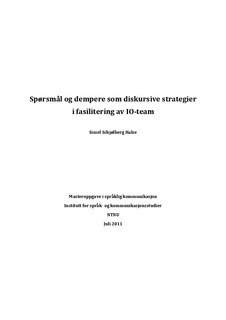Spørsmål og dempere som diskursive strategier i fasilitering av IO-team
Master thesis
Permanent lenke
http://hdl.handle.net/11250/244010Utgivelsesdato
2011Metadata
Vis full innførselSamlinger
Sammendrag
The need for improvement in the petroleum industry has been met through changes in work practices, called Integrated Operations (IO). Changes in the organizations also mean changes in communication practices, for example seen through extended use of cross-professional teams and collaborative technologies. Changes in where we interact, who we interact with, and not least, what purpose the interaction has, create the need for changes in how we interact. With an increasing number of multidisciplinary and distributed teams, there is an increasing need for interactional management in order for the new teams to reach their full potential.
This Master’s thesis examines interactional management of group processes, a practice often referred to as facilitation. Facilitation is seen as the activities a facilitator performs before, during, and after a meeting to help a team achieve its outcomes. The empirical data on which the study is based, is collected from an international oil and gas operator. The primary data consists of video recordings of daily meetings, the secondary data of an interview with the facilitator, ethnographic data, observations and field notes.
Most of the literature on facilitation distinguishes between process facilitation and content facilitation. This study shows that the facilitator role must be seen as more complex and as constituted in a combination of interactional, technical/professional and organizational expertise. The different modes of expertise are visible at the interactional level. Existing literature on facilitation focuses primarily on the "external", third party facilitator, whereas this study provides insights into "internal" facilitation of teams, executed by an in-house member of the organization with a given mandate.
The interactional analysis of the study focuses on discursive devices employed by the facilitator, more specifically, how the facilitator utilizes questions and hedges in facilitating the cross-professional and virtual team. Questions are used to clarify and to elicit information, which is important in a decision making process, but, questions are also useful devices in ensuring meeting progression. The use of hedging is functional for the facilitator role because it gives room for the other participants to express their expertise and to give input to the discussion. One can say that the facilitator keeps the discussion open and thus facilitates joint decision-making. Both hedges and questions are important discourse devices for the facilitator in this setting for marking the boundaries of her technical/professional expertise, and for ensuring that the expertise of the entire team is put to use. In addition, hedges and questions are important discourse devices in the demarcation of the facilitator’s, as well as the team’s, decision-making authority. The boundaries are marked on an interactional level, but require organizational expertise.
